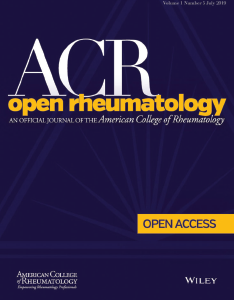
The July issue of ACROR included studies on the tolerability and effectiveness of an adalimumab biosimilar in ankylosing spondylitis.
The ACR’s newest journal, ACR Open Rheumatology (ACROR), launched in 2019 with all articles published in full online. The journal publishes high-quality, rigorously peer-reviewed articles on original investigations in rheumatology research, including basic science, clinical science, epidemiology, health outcomes and education, as well as commentaries and reviews.
Open access is on the rise. A 2017 study estimates approximately 28% of scientific literature was open access and accessible online without a paywall. That’s about 19 million out of 67 million articles, and the proportion of open access articles is growing.1
ACROR joins the ACR’s other journals, Arthritis & Rheumatology (A&R) and Arthritis Care & Research (AC&R), to deliver a broad range of rheumatology research to a wide audience and include creative work, says Edward H. Yelin, PhD, emeritus professor of medicine at the University of California, San Francisco (UCSF), and co-editor-in-chief of ACROR with Patricia P. Katz, PhD, also a professor of medicine at UCSF.
“What’s unique about ACR Open Rheumatology is that we [have] no boundaries. These articles have to pass a rigorous peer review muster, but they can cover a broad range of topics,” says Dr. Yelin. “In Arthritis & Rheumatology, most of the articles published are either clinical trials or basic and translational science. Arthritis Care & Research is more focused on clinical research, including epidemiology and behavioral science.”
Stretch the Envelope

Sergey Nivens / shutterstock.com
Many top medical journals can accept only 10–15% of the articles submitted due to space restrictions, tight publication budgets or other factors, says Dr. Yelin.
“What tends to get through the publication review process when acceptance rates are very low are papers that have unimpeachable methodologies, but they may not always contain the most interesting science or may not stretch the envelope very much,” he says. “We can accept work that may be a little more creative, while still passing through rigorous peer review. Manuscripts that may be interesting to ACROR may have authors who don’t always buy into the accepted wisdom, but they are adhering to stringent standards of quality in their research. There is a potential for this journal to create a place for that creative work that meets high standards of rigor and yet reaches a wide audience.”
Studies that may not qualify for A&R or AC&R based on the assigned priority score “may still report important science,” says Shervin Assassi, MD, MS, chair of the ACR Committee on Journal Publications. Dr. Assassi is an associate professor of rheumatology and clinical immunogenetics at the University of Texas Health Sciences Center, Houston, and McGovern Medical School. “I truly believe ACR Open Rheumatology is addressing an unmet need in our community.”


